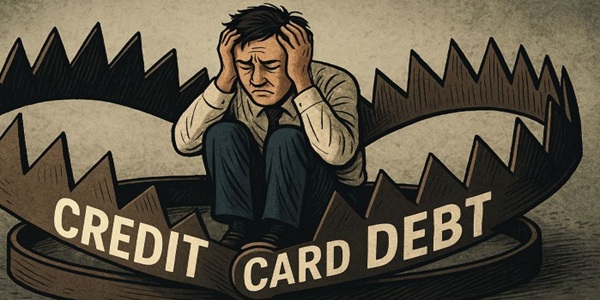The Debt Trap No One Wants to Talk About: Repaying Credit Card Debt in America
 The Real American Dream? Swipe now, suffer later! Debt has replaced savings as the new normal—and no one’s talking about it.
The Real American Dream? Swipe now, suffer later! Debt has replaced savings as the new normal—and no one’s talking about it.This addiction is legal, celebrated, and destroying households. Repaying credit card debt is draining families nationwide, yet the media sugarcoats it. Enough with the silence. Let’s talk about what’s really happening. Because until we confront the reality behind the numbers, we’re doomed to repeat the cycle—one swipe at a time.
The Staggering Reality of Credit Card Debt
In the U.S., the average family carries between $5,000 and $8,000 in credit card balances. That’s not just a number—it’s a lifestyle financed by borrowed money. More than $1,000 per year is paid in interest alone, per household. Multiply that across the country, and Americans are spending over $1 trillion annually on credit, with more than half of that remaining unpaid.
Even more alarming? Over 90% of Americans’ disposable income is now funneled toward repaying debt. Not investing. Not saving. Just digging out of a financial hole. If this trend continues, one in every hundred families could face bankruptcy. And yet, we keep swiping.
How Did We Get Here?
Just a few decades ago, debt was taboo. You saved for what you wanted. You paid cash. Bad credit meant no credit card—period. Fast forward to today, and we’ve normalized living beyond our means. The “buy now, pay later” mentality has metastasized into a full-blown crisis.
America’s consumer culture thrives on instant gratification. Retirement savings are an afterthought. Emergency funds are rare. Banks now offer inflated interest rates just to entice people to save. But the truth is, we’re not saving—we’re spending, and we’re borrowing to do it.
The Credit Card Industry: Profiting from Pain
Let’s not pretend the credit card industry is innocent. Billions of dollars are spent annually on marketing, administration, and interest collection. The average American receives at least one credit card offer in the mail every single day. That’s not convenience—it’s predatory saturation.
And the costs go far beyond the individual. Bankruptcy proceedings clog the court system. Government-funded debt counseling programs strain public resources. When consumers spend on interest instead of goods and services, the entire economy suffers. Repaying credit card debt isn’t just a personal issue—it’s a national one.
It’s Not Just About Overspending
Here’s where the narrative gets twisted. Many assume that credit card debt is the result of reckless spending. But data tells a different story. Most people fall into debt due to circumstances beyond their control—job loss, medical emergencies, or unexpected life changes.
In these moments, credit cards become lifelines. But they’re lifelines with hooks. Interest compounds, balances balloon, and what started as a temporary fix becomes a long-term trap. Repaying credit card debt becomes a Sisyphean task, especially when minimum payments barely touch the principal.
The Psychology of Debt: Why We Stay Stuck
Debt isn’t just financial—it’s psychological. The shame, stress, and anxiety associated with credit card debt can be paralyzing. Many people avoid looking at their statements, delay payments, or convince themselves that “everyone else is doing it too.”
But denial doesn’t pay down balances. Facing the reality of your debt is the first step toward freedom. And yes, it’s uncomfortable. But discomfort is better than financial ruin.
Repaying Credit Card Debt: A Path Forward
So what can you do? First, acknowledge the problem. Then, take action. Here are some practical steps to start repaying credit card debt:
- Assess your total debt: Know exactly how much you owe and to whom.
- Prioritize high-interest cards: Focus on paying off the cards with the highest APRs first.
- Consider a balance transfer: If you qualify, moving your debt to a lower-interest card can save you money.
- Create a realistic budget: Cut unnecessary expenses and allocate more toward debt repayment.
- Build an emergency fund: Even a small cushion can prevent future reliance on credit.
- Seek professional help: Organizations like American Consumer Credit Counseling (ACCC) offer step-by-step guidance to reduce debt and regain control.
The Controversial Truth: The System Is Rigged
Here’s the part no one wants to say out loud: the system is designed to keep you in debt. Credit card companies profit when you pay interest—not when you pay off your balance. They want you to make minimum payments. They want you to stay stuck.
Repaying credit card debt isn’t just about discipline—it’s about resisting a system that thrives on your financial instability. It’s about reclaiming your power in a culture that encourages overspending and punishes financial hardship.
Final Thoughts: Break the Cycle
Repaying credit card debt is hard. It requires sacrifice, strategy, and a willingness to confront uncomfortable truths. But it’s also liberating. Every dollar you pay down is a step toward freedom. Every balance you eliminate is a blow against a system that profits from your pain.
So don’t just pay your bills—challenge the narrative. Talk about debt. Share your story. And most importantly, take action. Because the only thing worse than being in debt is believing you’ll never get out.
Related pages you might also like
Beyond the Basics: Advanced Tips for Paying Off Credit Cards
Discover proven methods like the avalanche and snowball strategies to eliminate debt faster, save on interest, and regain financial control.
Best Credit Card Deals
Explore top offers that can help you save on interest, earn rewards, or take advantage of balance transfers—smart choices for anyone managing debt.
Cash Advances and Credit Card Checks
Learn how cash advances work, when they might help, and how to steer clear of high fees, steep interest, and financial setbacks.
Consolidation Loans
Simplify your repayment strategy by combining multiple debts into one—this guide breaks down how consolidation works and when it makes sense.
Home Page > Real Estate Articles >> Repaying Credit Card Debt

